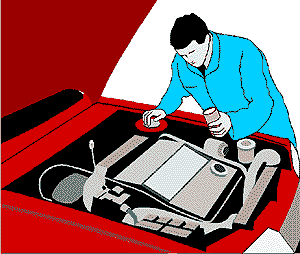Most car owners believe that the only benefit of vehicle maintenance is for a longer car life. Although this is a major benefit, vehicle service can actually save fuel. Performing routine vehicle maintenance keeps the car running at top performance levels. A vehicle that is running at top performance levels is a vehicle that is also running at top efficiency levels.
Save Gas with the Correct Engine Oil Change Intervals
Not changing the engine oil and filter at the recommended intervals can cause the oil to thicken. As the motor oil thickens, it causes more friction to the moving internal engine components. The car’s engine has to work harder and will burn more fuel to compensate for the added friction. Using synthetic versus conventional motor oil can also help to save fuel. Synthetic motor oil helps to reduce friction to internal engine components.
Dirty Air Filter’s Affect on Fuel Economy
There are four basic elements for a car’s gas engine to function.
Fuel (gas)
Compression
Ignition (spark plugs)
Air
A dirty air filter restricts the flow of air into the engine. The more restricted the airflow, the harder the engine has to work. The air to fuel mixture is critical to keep the vehicle running at top efficiency levels. If the airflow is restricted, the vehicle will compensate by increasing the fuel. If the car is driven in dusty areas, the filter should be checked more frequently and replaced as necessary.
Vehicle Tires and Fuel Efficiency
Proper tire maintenance is a key element for fuel efficiency. Checking the tires to make sure they are properly inflated will save gas. If the tires are under inflated, it creates more road resistance. To compensate for the added road resistance for under inflated tires, the vehicle’s computer will increase the amount of fuel to the engine. Tire inflation should be checked as a weekly routine and air added as necessary to keep the proper inflation levels.
Spark Plugs and Fuel Economy
The engine spark plugs ignite the gasoline. If the spark plugs are not changed at the proper service intervals, they may not ignite the fuel as efficiently. This could result in excess unburned fuel escaping through the intake and/or exhaust system of the vehicle. Changing the spark plugs at recommended intervals will result in a more efficient running engine and save fuel.
Summary of Gas Saving Vehicle Maintenance Services
Changing engine oil and filter at proper service intervals
Replacing the engine air filter when it’s dirty
Maintaining proper tire inflation
Replacing engine spark plugs at recommended intervals
Choosing one of these gas saving maintenance services will amount to very little fuel savings. However, adhering to all of these routine maintenance items could result in a noticeable improvement in fuel mileage. For the recommended maintenance schedule, consult the vehicle owner’s manual or manufacturer


















